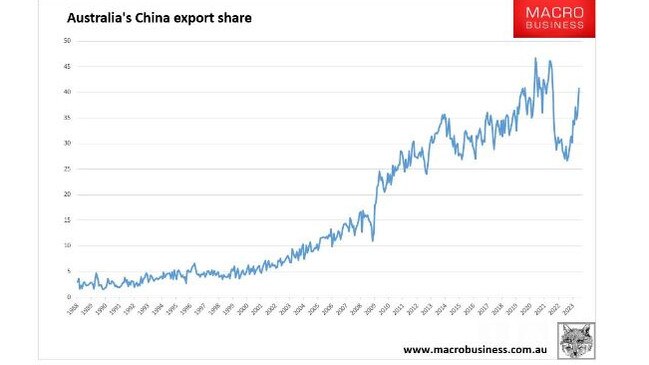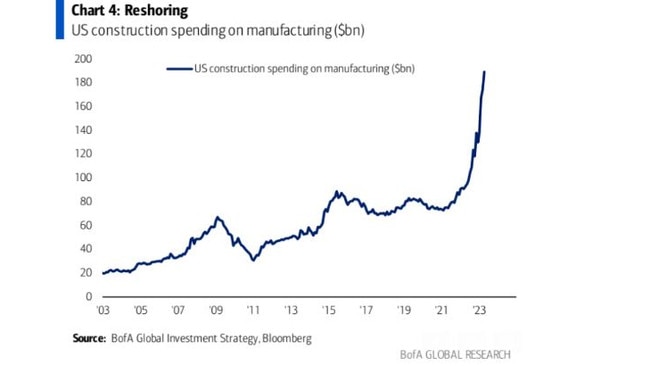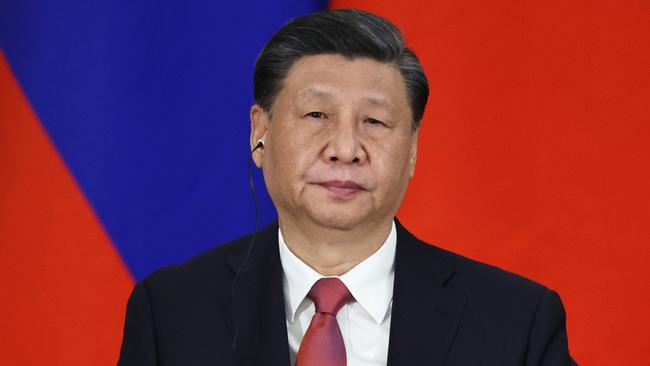’What have we lost?’: Why ‘crawling back’ to China after trade war is a ‘very bad idea’
Australia’s relationship with China was at an all-time low only a few years ago – but now we’ve proved we don’t actually need Beijing.
Economy
Don't miss out on the headlines from Economy. Followed categories will be added to My News.
COMMENT
Fool me once, shame on you, fool me twice, shame on me.
Australia’s relationship with China was at an all-time low only a few years ago.
Insults were exchanged daily between the political leaders. China assaulted Australia with trade blockades, cyber attacks and demands that we end our democratic institutions. Its embassy “wolf warriors” filled the local press with threats.
Today, all is hunky dory again. What a victory for the quiet diplomacy of the Albanese government!

But is it?
What have we achieved by pivoting back to China, and what have we lost? And what is in prospect to give it policy sense?
Trade success
The Albanese government’s concerted campaign to lower the temperature of relations has resulted in China lifting most of its trade bans on Australian goods.
Coal and barley are flowing back to China, and our trade dependence upon that nation is once again exploding.

The government is still working on wine, but it appears inevitable that those bans will be lifted too.
Our PM will likely sail to China to celebrate with Xi Jinping later in the year.
Trade failure
The question is, was this a good idea? Australian exporters had worked hard to win new markets for their China-banned goods. And the diversification considerably reduced Chinese economic power over Australia.
The Productivity Commission recently reported that the impact of the Chinese trade war on Australia was close to nil, so what was the hurry in returning there?
This question becomes more stark considering that China hasn’t changed since its Covid-era battles with Australia. If anything, it is even more bellicose with neighbours and Taiwan.
Beijing decided that the trade war with Australia wasn’t in its interests because it was helping galvanise global liberal democracies against it.
And that is what Australia has given up in re-engaging in China. It has weakened the liberal democratic coalition that mobilised to help protect us.
A very bad idea
Despite the Australian government’s relaxed attitude towards being attacked by China, the US is not so blase. It has taken the Australian example and other factors as a salutary lesson for when the sovereign should focus on economic resilience over efficiency.
It is using industry and trade policy to de-risk its trade with China. Supply chains to Canada, Mexico and at home are booming. American factories are being built at the fastest pace since WWII.

The US is preparing itself for something bad happening to its relationship with China. Given the vulnerabilities exposed by Covid and China’s ongoing encroachments upon liberal Asian neighbours, this is some sensible insurance.
From the Australian perspective, one can only wonder why this does not alarm Canberra. If our strategic sponsor is preparing for the possibility of relations so sour that trade is blocked with our major trading partner, why is the Albanese government furiously re-engaging trade with the same?
No upside
Making matters worse, the Chinese economy is in trouble. Its property and infrastructure funding bubbles are bursting as its demographics turn headwinds.
The economy is being swamped with deflation but can’t cut interest rates for fear of capital flight and a crashing currency. Its fiscal stimulus is choked.

There is very little upside in the sputtering Chinese development model to export to.
These economic pressures are already lifting youth unemployment to unsettling levels. If that continues and the Chinese people become restive, the CCP may be forced to do something rash.
Last throws of the dice include the annexation of Taiwan, which would block all Australian trade routes to China.
Why is the Albanese government doing everything possible to remove any insurance Australia should have?
David Llewellyn-Smith is Chief Strategist at the MB Fund and MB Super. David is the founding publisher and editor of MacroBusiness and was the founding publisher and global economy editor of The Diplomat, the Asia Pacific’s leading geopolitics and economics portal. He is the co-author of The Great Crash of 2008 with Ross Garnaut and was the editor of the second Garnaut Climate Change Review.
More Coverage
Originally published as ’What have we lost?’: Why ‘crawling back’ to China after trade war is a ‘very bad idea’




